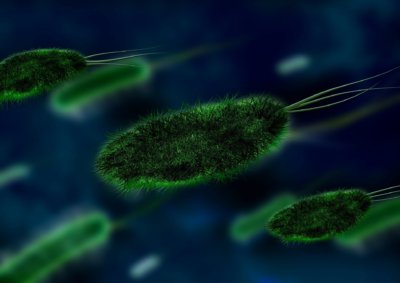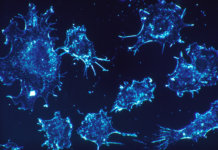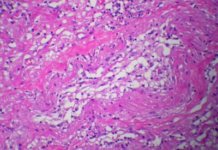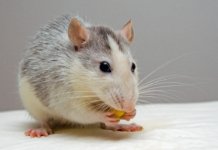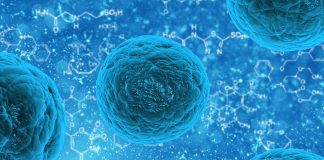Bacteria and longevity: the unlikely anti-aging combination
The intestine is said to be humans’ second brain. Indeed, the 200 million neurons that innervate it and the microbiota (the ecosystem of bacteria, fungi and micro-organisms present in the gastrointestinal tract[1]) form an entity that influences our moods and emotions, and intervenes in the development of neurological diseases such as autism and depression[2]. The brain, the nervous system of the intestine and the intestinal microbiota communicate bidirectionally through what is called the gut-brain axis. This communication axis transmits different types of information: metabolic, immunological, endocrine and neuronal, derived from bacterial cells and their metabolites[1].
Bacteria in the intestinal microbiota influence aging and longevity
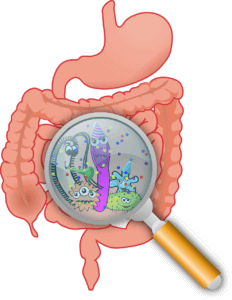
Recently, studies have focused on the influence of the intestinal microbiota on aging and longevity. The composition of the microbiota varies with age and these alterations have been associated with disease development and aging. This is due to the ability of the microbiota to simultaneously modulate several age-related processes such as inflammation, oxidative stress, metabolite regulation and energy homeostasis[1] through the gut-brain axis. Therefore, the microbiota of the intestine has been identified as a therapeutic target against age-related diseases[1].
In a new study[1], researchers analyzed the impact of a mixture of three probiotics (live bacteria or yeasts that bring health benefits to the host) and a new prebiotic (a food substance composed of sugars that allows the growth of probiotic microorganisms) on the lifespan of male drosophila. It was shown that the intestinal microbiota of Drosophila varied with age and that these changes were comparable to those observed in humans. The mixture of probiotics and prebiotics used in the study increased the longevity of male drosophila by 60%, and a probiotic formulation alone increased longevity by 55%[1].
Modify intestinal bacteria to slow aging
According to the researchers, the results of their study are similar to other results from similar experiments on murine models: different combinations of probiotics have had beneficial effects, notably against neurodegeneration[3], memory loss[4], immunity as well as antioxidant defenses[5]. Probiotics have also reduced inflammation and increased longevity in mice[6]. Finally, in other studies, probiotics have increased the lifespan of C. elegans by stimulating the innate immune response, reducing oxidative stress[7] or through mechanisms mimicking caloric restriction[8].
The composition of the gastrointestinal tract and its effects on health have been studied for many years, but it is only recently that aging has been associated with changes in the intestinal microbiota. Conversely, microbiota alterations have been associated with age-related chronic disease phenotypes. A diet rich in probiotics and prebiotics can help maintain a healthy intestinal microbiota in order to delay the onset of chronic diseases and extend life. In multiple experiments, symbiotic formulations (i.e. mixing probiotics and prebiotics) have had beneficial effects against age-related biological disorders and for longevity. In the future, specific symbiotic mixtures could be developed to prevent the occurrence of chronic diseases such as cardiovascular disease, diabetes, cancer, obesity and neurodegenerative diseases[1].
References :
[1] Susan Westfall, Nikita Lomis & Satya Prakash, Longevity extension in Drosophila through gut-brain communication. Scientific Reports, (2018) 8:8362 DOI:10.1038/s41598-018-25382-z
[2]
[3] Dinan, T. G. & Cryan, J. F. Gut instincts: microbiota as a key regulator of brain development, ageing and neurodegeneration. The Journal of Physiology 595, 489–503 (2017).
[4] Jeong, J.-J., Kim, K. A., Hwang, Y.-J., Han, M. J. & Kim, D.-H. Anti-infammaging efects of Lactobacillus brevis OW38 in aged mice. Benef Microbes 7, 707–718 (2016).
[5] Sharma, R. et al. Dietary supplementation of milk fermented with probiotic Lactobacillus fermentum enhances systemic immune response and antioxidant capacity in aging mice. Nutr Res 34, 968–981 (2014).
[6] Matsumoto, M., Kurihara, S., Kibe, R., Ashida, H. & Benno, Y. Longevity in mice is promoted by probiotic-induced suppression of colonic senescence dependent on upregulation of gut bacterial polyamine production. PLoS One 6, e23652 (2011).
[7] Grompone, G. et al. Anti-infammatory Lactobacillus rhamnosus CNCM I-3690 strain protects against oxidative stress and increases lifespan in Caenorhabditis elegans. 7, e52493 (2012).
[8] Zhao, Y. et al. Lactobacillus salivarius strain FDB89 induced longevity in Caenorhabditis elegans by dietary restriction. J Microbiol 51, 183–188 (2013).
Anne Fischer

Author
Auteur
Anne is studying medicine science at the Institute of Pharmaceutical and Biological Science in Lyon and she has graduated with a Bachelor’s degree in molecular and cellular biology at the University of Strasbourg.
More about the Long Long Life team
Anne étudie les sciences du médicament à l’Institut des Sciences Pharmaceutiques et Biologiques de Lyon. Elle est titulaire d’une licence en biologie moléculaire et cellulaire de l’Université de Strasbourg.
En savoir plus sur l’équipe de Long Long Life


